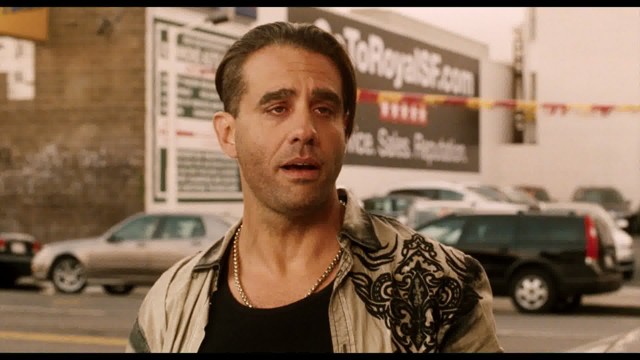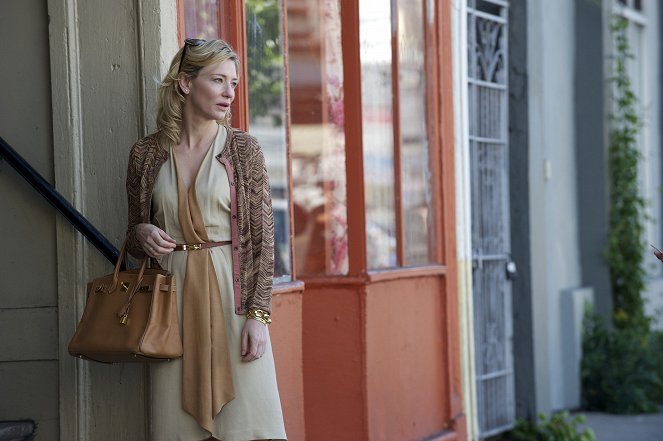Directed by:
Woody AllenScreenplay:
Woody AllenCinematography:
Javier AguirresarobeCast:
Cate Blanchett, Alec Baldwin, Sally Hawkins, Bobby Cannavale, Andrew Dice Clay, Peter Sarsgaard, Louis C.K., Alden Ehrenreich, Michael Stuhlbarg, Max Casella (more)VOD (3)
Plots(1)
After everything in her life falls to pieces, including her marriage to wealthy businessman Hal (Alec Baldwin), elegant New York socialite Jasmine (Cate Blanchett) moves into her sister Ginger's (Sally Hawkins) modest apartment in San Francisco to try to pull herself' back together again. Jasmine arrives in San Francisco in a fragile mental state, her head reeling from the cocktail of anti-depressants she's on. While still able to project her aristocratic bearing, Jasmine is emotionally precarious and lacks any practical ability to support herself. She disapproves of Ginger's boyfriend Chili (Bobby Cannavale), who she considers another 'loser' like Ginger's ex-husband Augie (Andrew Dice Clay). Ginger, recognizing but not fully understanding her sister's psychological instability, suggests that she pursue interior design, a career she correctly intuits that Jasmine won't feel is beneath her. In the meantime, Jasmine begrudgingly accepts work as the receptionist in a dentist's office, where she attracts the unwanted attentions of her boss, Dr. Flicker (Michael Stuhlbarg). Feeling that her sister might be right about her poor taste in men, Ginger starts seeing Al (Louis C.K.), a sound engineer whom she considers as a step up from Chili. Jasmine sees a potential lifeline when she meets Dwight (Peter Sarsgaard), a diplomat who is quickly smitten with her beauty, sophistication and style. (Warner Bros. Home Entertainment)
(more)Videos (3)
Reviews (10)
A fantastic social satire and a masterfully drawn probe of the age-old rivals – poverty and wealth. But Woody Allen is not so transparent and silly idealistic as to show that being poor can be cool and being rich, or the habits and attitudes of the rich, are actually superficial and bad. He goes much further and blends the two worlds in a sophisticated and very sober way, showing even the complete opposites, while eviscerating and then presenting perfectly clean real-life situations every two minutes or so. When someone makes documentaries about animals or flora, it's fine, when Woody Allen makes documentaries about people, it's even more interesting.
()
The best Allen in recent years... There is actually only one thing that hurts this film - when one perceives it as another of the director's parodies and caricatures of superficial petty bourgeoisie and snobbery. But this film is much more of a tragedy about lies and endless hypocrisy, a tragedy of a character who cannot be himself, even if he is himself. The functional mirror structure, in which Allen places a (seemingly) comic monologue at the beginning and a clearly tragic monologue at the end, well reflects the path that the viewer must find with the withdrawn, unpleasant and unsympathetic protagonist. Jasmine has a hard time laughing / smiling, and it's hard to take a clear position on her and it's hard to judge what role she should specifically play in the testimony - is it a self-parody, an ironic smile to superficiality, a serious character...? The protagonist is as unclassifiable as the chameleon and in every detail the brilliant performance of Cate Blanchett, who undoubtedly played her life role on the verge of sacrificing her appearance (in some scenes she is not even recognizable). And the bitter old man Allen unfolds a scathing anti-tale about a crumbling life so consistently and ruthlessly that I had to collect myself for a few hours after the film ended. It's good to know that Woody can still do that. And that he is still able to make a risk-evoking film like the Coens’ A Serious Man (and not only because Michael Stuhlbarg is running around in this film again). Dark, sardonic, brilliant, one of the surprises of the year.
()
It’s always the same with me and Woody Allen. Whenever I go see his movie, I don’t know whether I’ll be satisfied, or whether I’ll be rolling my eyes in disbelief. Once, I was pleasantly surprised, another time I would love to slap him across the face for his choice of topic to base his movie on. But he’s got the name and reputation for it and I need to respect that. But his dialogue-based movies don’t always sit well with me and it was the case with this movie as well. Cate Blanchett looks pretty likeable in the poster. Overall, the poster makes it look as if it was going to be another good dialogue-based movie with interesting characters with none other but Cate in the lead. She literally radiates grace. But then the movie started and I got bored. I gradually got to meet the main characters. I started getting to know Cate, who kept trying to escape reality. I got to know her friend, her boyfriend, who looked like Till Lindemann of Rammstein and not much was happening really. I’m still not in the mood where I would be enjoying every single dialogue that appears in the movie. But Woody’s movies are based on that. And also on the setting of the story. But with this one I have to admit that I may not have seen a worse depiction of New York. That’s how simple it is. This movie is really bad, and not even the ending can save that. You see at that point the entire story leans on everyday reality and all the characters get an epileptic fit. At least Woody left in a message. And the message is that the most important thing is to keep it all together.
()
“What will happen when there’s no more Woody?” someone wrote in their review on a Woody Allen movie. I keep
asking myself that when I watch almost every single one of his movies. No one else can write such dialogue. No one else
can portray characters in this way and have them played by such aptly chosen actors who, for just a small paycheck,
enjoy every line. Human, intelligent, sensitive and conveyed with a light ironic touch, Blue Jasmine is also sad, making
you sympathize with the protagonist.
()
Jeanette did two things in her life - she changed her name to the romantically sounding Jasmine and seduced a successful businessman. The latter guaranteed her a comfortable life full of shopping, fun, and a sense of importance. Social status meant everything to her and she confirmed it through a series of expensive rituals. One day, along with the fall of her husband, her previous certainties collapse, and, one might say, a sobering up occurs. But alas, Jasmine decides to retreat into a world of illusions. She faces the inevitable incursions of unpleasant reality with hysterical defensive reactions. With her usual self-assurance, she decides to take advantage of her step-sister's goodwill and moves into her apartment. Woody used the same model situation that Tennessee Williams arranged in his famous drama "A Streetcar Named Desire." He directed it elsewhere, though, and certainly doesn't copy the aforementioned title. The film can be simplistically seen as a straightforward critique of snobbery and at the same time as a brilliant acting creation by two great actresses. Alongside the famous Cate Blanchett, the equally talented Sally Hawkins excels, and also has great comedic potential. In the second aspect, Jasmine's character functions as a symbol of the blindness of those who refuse to admit that times are changing and that there are very few things that do not need to adapt to the passage of time. Industrial sectors, social classes, countries, and even entire civilizations find themselves in Jasmine's position and react similarly laughably and dysfunctionally as she does. The film is more of a comedy than a drama. However, it is a bittersweet comedy and one that provokes reflection rather than bursts of laughter. Overall impression: 85%.
()



Ads